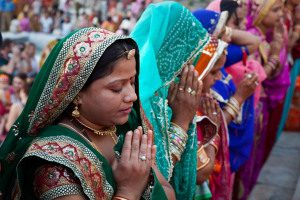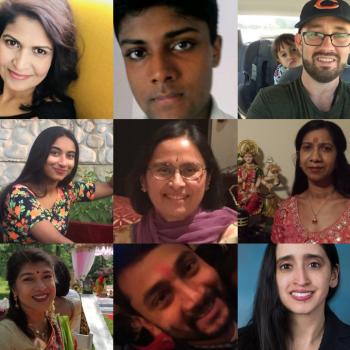Curious to know what people were wondering about Hindus and Hinduism, I went to Google and entered some prompts. For example, I typed “Why do Hindus” and then paused to see what questions would come up. Today’s Question is…
Why Do Hindu Beliefs Vary Widely?
Many religions have a clear history that’s easy to trace. Many are founded by one person or inspired by one person. Hinduism is not like that.
In ancient times there were simply beliefs and practices. The people in what is now India lived in a certain way and the name for their way of life was simply The Eternal Truth. At that time they had no need to codify or distinguish their beliefs from others. Everyone believed what he believed and there were some common threads and common ideas and worship practices, but people mostly believed and worshiped the way others around them did in their little area.
At some point people of vastly different beliefs, people who had a name for their religion and rules about what made it separate, came along and defined Hinduism as anything that was not what they were.
It covered a lot of different beliefs and understandings. For Muslim invaders, anyone who didn’t believe that Mohammad was the greatest prophet of the world and that the world was separate from God were “other” and those “other” were all called Hindu eventually. For Christians, anyone who didn’t believe that the only option was to worship Jesus in exclusion of any other God was “other.”
And so you will find that there are Hindus who are monotheistic, who believe that all the Gods are representations of One God, and there are Hindus who are polytheistic, who think that trying to put all the Gods into One ultimate God is pandering to invading monotheistic religions.
This has made it rather difficult to define what Hinduism is and what makes someone a Hindu.
Hinduism has become a bit more codified over the centuries of having to define itself against other religions. It’s broken down into broad sects that could each be called a different religion in a way. I suppose it’s more like very different interpretations of the same texts, stories, and practices.
A lot of people look to the Vedas as the definition of a Hindu. Vedas are primary text spiritual scriptures, so those who believe in the Vedas are Hindus. Of course there are also many people who grew up Hindu and perhaps illiterate or uninterested in study who are perhaps following the Vedas through the ritual of what has been passed down through their families.
The Himalayan Academy, which is very invested in defining ourselves in a way that distinguishes us from other spiritual paths, has a list of core Hindu beliefs:
- Hindus believe in a one, all-pervasive Supreme Being who is both immanent and transcendent, both Creator and Unmanifest Reality.
- Hindus believe in the divinity of the four Vedas, the world’s most ancient scripture, and venerate the Agamas as equally revealed. These primordial hymns are God’s word and the bedrock of Sanatana Dharma, the eternal religion.
- Hindus believe that the universe undergoes endless cycles of creation, preservation and dissolution.
- Hindus believe in karma, the law of cause and effect by which each individual creates his own destiny by his thoughts, words and deeds.
- Hindus believe that the soul reincarnates, evolving through many births until all karmas have been resolved, and moksha, liberation from the cycle of rebirth, is attained. Not a single soul will be deprived of this destiny.
- Hindus believe that divine beings exist in unseen worlds and that temple worship, rituals, sacraments and personal devotionals create a communion with these devas and Gods.
- Hindus believe that an enlightened master, or satguru, is essential to know the Transcendent Absolute, as are personal discipline, good conduct, purification, pilgrimage, self-inquiry, meditation and surrender in God.
- Hindus believe that all life is sacred, to be loved and revered, and therefore practice ahimsa, noninjury, in thought, word and deed.
- Hindus believe that no religion teaches the only way to salvation above all others, but that all genuine paths are facets of God’s Light, deserving tolerance and understanding.
- Hinduism, the world’s oldest religion, has no beginning–it precedes recorded history. It has no human founder. It is a mystical religion, leading the devotee to personally experience the Truth within, finally reaching the pinnacle of consciousness where man and God are one.
But I’m not really sure that all Hindus believe all these things!
In the end, I think the why of the variety of Hindu beliefs is that it is a path characterized by individual growth and learning. It focuses on our inner guide and our inner knowledge, trusting that we have the Truth within us already.
And so every Hindu will express, understand, and grow towards that Truth in slightly different ways. Each understands it in the way that he is ready for in that moment.
EDIT: I am removing the section where I define Hinduism by contrasting it against other religions. As you will see in the comments, several people have complained that I have not represented their religion fairly. I claim no expertise in religions that are not my own. I studied other religions as one does when trying to determine if the religion one is following is the best one there is.
Other Google Questions Answered
Why Do Hindus Pierce Their Nose?












